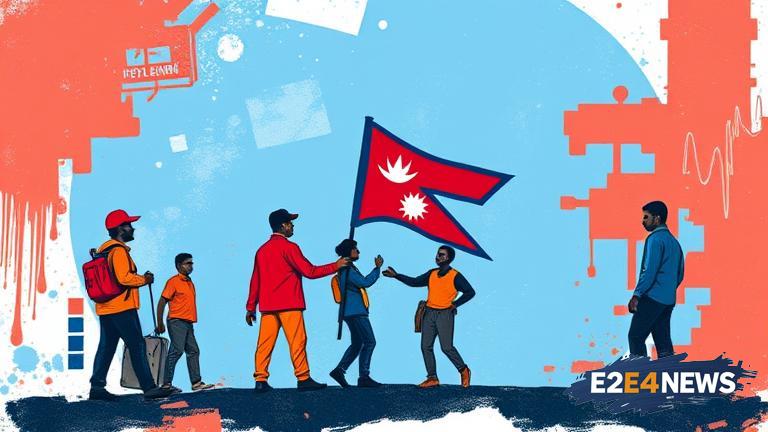The International Labour Organization (ILO) and Non-Resident Nepalis Association (NRNA) have recently announced a partnership to provide support to Nepali migrant workers. This collaboration aims to address the challenges faced by Nepali migrants, including exploitation, abuse, and lack of access to social services. The ILO and NRNA will work together to promote fair recruitment practices, improve working conditions, and provide training and education to migrant workers. The partnership will also focus on raising awareness about the rights and responsibilities of migrant workers, as well as promoting social protection and inclusion. The ILO has been working to improve the lives of migrant workers for many years, and this partnership with NRNA will help to amplify their efforts. NRNA, on the other hand, has been advocating for the rights of Nepali migrants for over two decades. The organization has a strong network of members and partners around the world, which will be instrumental in reaching out to Nepali migrant workers. The partnership between ILO and NRNA is a significant step forward in addressing the challenges faced by Nepali migrant workers. It is estimated that there are over 2 million Nepali migrant workers around the world, with many of them facing exploitation and abuse. The ILO and NRNA will work together to provide support and protection to these workers, and to promote their rights and dignity. The partnership will also focus on promoting fair recruitment practices, which will help to reduce the risk of exploitation and abuse. The ILO has developed a number of tools and guidelines to promote fair recruitment practices, including the Fair Recruitment Initiative. The NRNA will work with the ILO to promote these tools and guidelines among its members and partners. The partnership will also focus on improving working conditions for Nepali migrant workers. This will include providing training and education on occupational health and safety, as well as promoting access to social services such as healthcare and education. The ILO and NRNA will also work together to raise awareness about the rights and responsibilities of migrant workers. This will include promoting awareness about the importance of fair recruitment practices, as well as the rights and responsibilities of migrant workers under international law. The partnership will also focus on promoting social protection and inclusion for Nepali migrant workers. This will include providing access to social services such as healthcare and education, as well as promoting inclusion and social cohesion. The ILO and NRNA will work together to promote the rights and dignity of Nepali migrant workers, and to support their social and economic development. The partnership is a significant step forward in addressing the challenges faced by Nepali migrant workers, and it is expected to have a positive impact on the lives of thousands of workers around the world. The ILO and NRNA are committed to working together to promote the rights and dignity of migrant workers, and to supporting their social and economic development. The partnership is a model for other organizations and countries to follow, and it is expected to have a positive impact on the lives of migrant workers around the world. The ILO and NRNA will continue to work together to promote the rights and dignity of Nepali migrant workers, and to support their social and economic development. The partnership is a significant step forward in addressing the challenges faced by Nepali migrant workers, and it is expected to have a positive impact on the lives of thousands of workers around the world.
